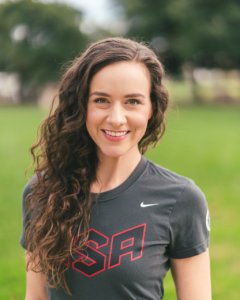One healthy topic that is dear to me is eating well for your vision. Our eyes play such a big role in our lives; they help us travel, interact with the world, avoid danger, see the many colors of nature, and so much more. All too often we take them for granted. Personally, I love talking about vision nutrition since in my sport of riflery, or in any Games-level sport, eye health is so key. Having healthy eyes has been essential to my sports career and a part of every medal-winning performance. So, let’s talk about how to eat well for our eyes and give them some well-deserved TLC.
Here are some of the key nutrients to eat for healthy eyes:
- Omega-3s: Fatty fish like salmon and anchovies, walnuts, chia seeds, and flaxseeds are all good sources. To get my omega-3s, I take my Life-Strip® every day. Plus, I love sprinkling flaxseed on my salads and into all my bread recipes.
- Bioflavonoids: Bioflavonoids such as anthocyanins are a great source of antioxidants and are the pigments that give red, purple, and blue plants their rich coloring. I choose dark red, purple, and blue fruits and vegetables whenever possible. A delightful dessert combination is plain Greek yogurt, blueberries, a ½ scoop of Life Shake™ Vanilla, and 90% dark chocolate shavings.
- Zeaxanthin and Lutein: Found in dark green vegetables such as kale, broccoli, collards, and raw spinach, egg yolk, whole-grains, and romaine lettuce, these nutrients become more bioavailable if you cook them. Try sautéing broccoli and kale with some garlic in olive oil and add a sprinkle of pink sea salt. Crack an egg into the mix for a nutritious breakfast.
- Vitamin C: Evidence suggests vitamin C may help lower the risk of developing cataracts, so be sure to add lots of low-sugar citrus sources into your daily nutrition. Grapefruit sections drizzled with honey and cinnamon are a great pick-me-up snack.
- Zinc: Zinc plays a vital role in helping vitamin A in your body’s production of melanin, a protective pigment in the eyes. Potent and everyday sources of zinc are shellfish, legumes, dairy, whole grains, seeds, and nuts. Add these to any meal—the more the better. A personal favorite of mine is three-bean quinoa salad with sunflower seeds and an olive oil dressing to top it off.
Lastly, there are a few lifestyle habits to keep in mind:
- Get a good amount of sleep, 8-9 hours if you can. This helps your brain-vision reaction speed stay top-notch.
- Hydration is critical to healthy vision. Dehydration can cause eye strain that can make your eyes feel dry, tired, and blurry. Try to drink at least 64 ounces per day, but optimum hydration is different for everyone. Here are my rules of thumb for healthy hydration: “Don’t be a thirsty parrot”—drink water before you are thirsty; “Sip don’t gulp”—sipping allows for better use of your water; and “Pale yellow your pee should be”—keep your urine a pale yellow color.
- Limit blue light and UV rays as much as possible to protect your eyes’ long-term health.
Thanks, Shaklee Family, for giving your eyes a little TLC. Stay healthy and safe!
 Sarah is the Shaklee Pure Performance Team dietitian/nutritionist. She is also a two-time competitor for the USA in the Summer Games, participating in the 10-meter Air Rifle event in 2012 and 2016. Her experience as an elite athlete and her status as a Registered Dietitian Nutritionist (RDN) and Licensed Nutritionist (LN), make her perfectly suited to consult with Shaklee athletes on their nutritional needs. Sarah graduated from Texas Christian University in Fort Worth, Texas with a BS in Nutrition in 2013, and then earned an MBA in Entrepreneurship and Healthcare Management. She specializes in weight loss, improved sport performance, diabetes prevention, heart health, healthy aging, smoking cessation, and performance goals. Her hobbies include church ministries, mountaineering, physical fitness, and gardening. Keep up with Sarah on her website, Instagram, Facebook, and Twitter.
Sarah is the Shaklee Pure Performance Team dietitian/nutritionist. She is also a two-time competitor for the USA in the Summer Games, participating in the 10-meter Air Rifle event in 2012 and 2016. Her experience as an elite athlete and her status as a Registered Dietitian Nutritionist (RDN) and Licensed Nutritionist (LN), make her perfectly suited to consult with Shaklee athletes on their nutritional needs. Sarah graduated from Texas Christian University in Fort Worth, Texas with a BS in Nutrition in 2013, and then earned an MBA in Entrepreneurship and Healthcare Management. She specializes in weight loss, improved sport performance, diabetes prevention, heart health, healthy aging, smoking cessation, and performance goals. Her hobbies include church ministries, mountaineering, physical fitness, and gardening. Keep up with Sarah on her website, Instagram, Facebook, and Twitter.






